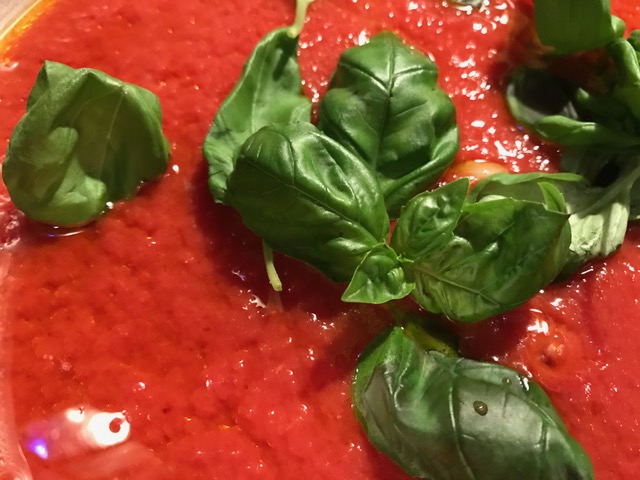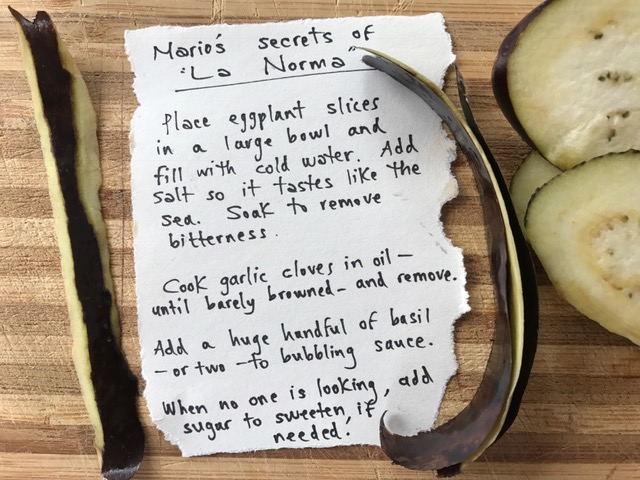Pasta alla Norma • Allison Radecki
Bretty Rawson
A Note from Curator Rozanne Gold: This dreamy essay comes from food writer and fabulous home cook, Allison Radecki, who describes her recent trip to Sicily in such a way that we experience an intimacy with her. Through her eyes we taste the pleasures of food and friendship, and get an up-close view of one of the world’s largest religious processions, La Festa di Sant’Agata, celebrated annually in Catania (Sicily’s second largest city) from Feb. 3rd-5th with the heart and soul of an entire community. Sant’Agata, the city’s patron saint, is also lovingly known as “La Santuzza” — the little saint — in the local Catanese dialect. Allison’s beloved friend, Mario, whose family home is in the Canalicchio neighborhood, teaches cooking at Catania’s“Piazza dei Mestieri,” preparing high school students to enter the restaurant world. They met while attending The University of Gastronomic Sciences in Italy’s Piedmont region, years ago. Pasta alla Norma, Sicily’s quintessential dish is something Mario and Allison make every time they are together — a ritual they share whether in New Jersey or in Italy. I, too, remember eating Pasta alla Norma every day when my husband and I travelled to Sicily — an island of volcanic pleasures. Grazie mille to Allison for her beautiful handwritten recipe, and for the joy that accompanies it.
BY ALLISON RADECKI
All you needed to see were the words “Flash sale to Europe” in your e-mail inbox, and you started to daydream. In a swirl of logistics and calculations you manage to free up a few days of freedom and click on two words that always forecast adventure: BUY TICKET.
And you’re off.
The plane goes up and down and up and down again until you land at Catania-Fontanarossa Airport. And there he is, your brother from another mother, who just happened to be born in the shadow of Europe’s largest volcano, beside the sea. You stare at each other, in disbelief; with excitement; with love. After all, you have just made the seemingly impossible possible (at this particular moment in your life) and have three of the world’s greatest gifts before you: Friendship. Time. Sicilian food.
You are really here, on this island kicked into the Mediterranean by the toe of Italy’s boot. Mario’s car winds through the port, past freighters and petrol tanks. Soon, you are offered a taste of this new place, at a kiosk that overlooks a bobbing fleet of docked boats. With a press, a squirt, and a stir, you sip your first glass of “selz, limone e sale.” It tickles your lips and tastes like the marriage of a lemon grove and the salt water before you.
At home in New Jersey, you wrapped your neck in a heavy scarf and scattered salt on your steps to stop from sliding on the ice. But here, the sun is strong. You sit and sip espresso together in the shadow of stone buildings as Mario attempts to explain what you are about to experience. You contemplate what this street will look like for the next three days as the city stops to honors its patron saint, whose bones will be pulled on a silver carriage — up hills and down thoroughfares — drawn by an endless ribbon of white-clad devotees, as it happens every year. That very night, you twirl your fork in a bowl of spaghetti, cooked al dente, in an attempt to catch every creamy bit of sea urchin that remains in your bowl.
The next day is electric. Brass bands chase towering candelabras through crowds. Velvet curtains hang from high balconies. The saint’s face is visible everywhere, on street corner magnet stands and balloons that fly overhead. Amidst the call of trumpets and the shouts of candle sellers, you duck into a crowded bar and are handed “la raviola,” fried half-moons filled with sweetened ricotta. Powdered sugar snows down on your shirt and sleeves and you laugh.
The following morning begins at 4 a.m. with a long walk to the Piazza Duomo (parking during the Festa di Sant’Agata is — as you can imagine — a holy mess). And though the city is still in darkness, the streets are alive with footsteps, voices, and the whirr of the milk frothing for cappuccinos to be sipped by men and women dressed in white. At the mass at dawn, handkerchiefs wave and a city sings out to welcome its protector. That afternoon, you watch from a high perch, surrounded by Mario’s family and friends — Giogió, Saro, Claudia, Daniele, Daria — and nibble fat, golden arrancini, as the saint sails past on the street below.
That night, at his family table, Mario, an exemplary teacher, cooks “La Norma," the pasta dish of his city, named after the operatic masterpiece of Bellini, another jewel in Catania’s crown. And, even though he regrets that it is not eggplant season, (“when they will be sweeter and more delicious”) you try to memorize the way in which the slices are bathed in salty water to release their bitterness, and how he unites the pasta, tomato sauce, basil, fried eggplant and shavings of ricotta salata, so that the result seems to echo Mt. Etna, which smokes in the distance.
After a night where massive candles, like tree trunks, line the sidewalks of the city, the saint says her final farewell. That is, until next year, when it will all begin again. And soon, with a final coffee and a bear hug of an embrace, you board the plane to return home.
Domani. You wake up to a snowstorm which cancels work and offers you an unexpected day of rest. You are thankful. And, though you can hear the scrape of shovels on sidewalks as you slowly acclimate to the new time and your old life, you dream of eggplants and basil and start to think about dinner.
PASTA ALLA NORMA
Adapted from a recipe by J. Kenji López Alt
Note: The ricotta salata sold in the USA is not aged anywhere enough for the true flavor of this dish. Seek out an imported ricotta salata from Italy at a specialty market or combine equal parts sheep’s milk feta with grated Pecorino Romano cheese.
INGREDIENTS
• Extra-virgin olive oil, for frying and more for drizzling
• 2-3 small Italian or Japanese eggplants, the skins roughly peeled, tops and bottoms trimmed, cut lengthwise into ½ inch thick slices
• Kosher salt
• 3 medium cloves of garlic, peeled and roughly crushed with the side of a large knife
• 1 (25 oz.) jar passata (tomato puree)
• 1 pound dry rigatoni or penne rigate
• A large handful of fresh basil leaves (for the sauce), as well as another handful of roughly torn large leaves for garnishing.
• Aged ricotta salata, finely grated
DIRECTIONS
1. Place eggplant slices in a large bowl and fill with cold water. Add enough salt to the water and swirl with your hands so that the water tastes like the sea. Allow the eggplant to soak in the salted water for half and hour. This will both flavor the slices and allow the eggplant’s bitter flavors to drain out into the salted water. Drain the slices and pat dry with paper towels.
2. Heat a thumb’s thickness of olive oil in a 12-inch non-stick or cast iron skillet over medium heat until shimmering. Add as much eggplant as fits in a single layer without overlapping. Cook until the eggplant is browned on both sides (but not dark brown or burnt). Transfer eggplant to a plate and set aside. Repeat with remaining eggplant, adding olive oil as necessary, until all eggplant is browned.
3. Heat remaining oil until it shimmers. Add garlic cloves to the oil and cook, until fragrant, but not browned. Remove cloves from the oil and discard.
4. Add the tomato puree to the oil and cook, stirring constantly until evenly incorporated. Bring to a boil, and add a large handful of basil (stems and all) to cook into the sauce.
5. Reduce to a bare simmer and cook, stirring occasionally, until liquid is thickened into a sauce-like consistency, about 15 minutes. Season to taste with salt. When no one is looking, add a tsp. of sugar to add sweetness, if necessary. Remove the cooked basil from the sauce and discard.
6. Meanwhile, bring a large pot of salted water to a boil and cook the pasta according to the ‘al dente’ package directions. Drain pasta, reserving 1 cup of cooking liquid. Return pasta to the pot.
7. Add the sauce to pasta and toss to coat, adding reserved pasta water if necessary to thin sauce to desired consistency. Add eggplant slices and toss to combine.
8. Serve pasta immediately, drizzled with extra virgin olive oil and garnished with grated ricotta salata and a handful of torn basil leaves. Serves 6
9. Think of Sicily.






